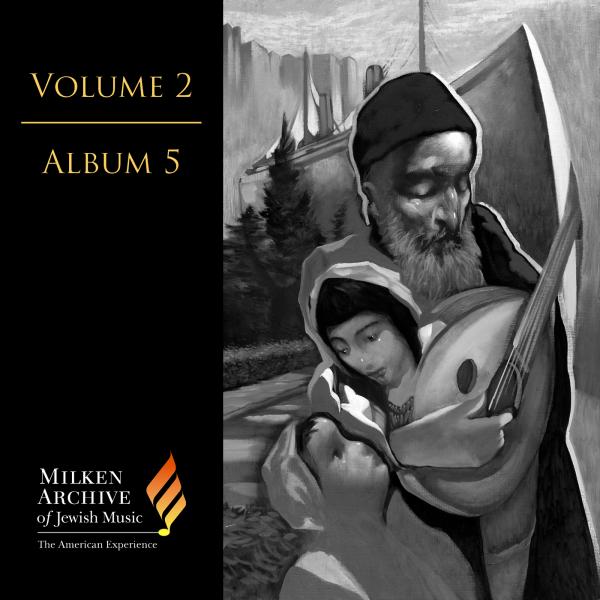Sung in Ladino
Only with you
Oh little girl, my next door neighbor
Since your childhood I was chasing you,
Wanting to play, to play with you,
Great joy filled my heart!
Oh little girl, I was your next-door neighbor,
Since your childhood I was chasing you.
You were hiding, but I always found you,
Great joy filled my heart!
REFRAIN:
Enchanting rose
So sweet to kiss
Beloved girl,
Only with you I want to live!
Oh young maiden, bridegrooms came downstairs!
I watched you from my window,
And when I saw your beauty,
I fell in love, I fell in love.
REFRAIN:
Enchanting rose
So sweet to kiss
Beloved girl,
Only with you I want to live!
Oh friend, since my childhood I admired you.
With joy I attained you.
To love through night and day,
Always to love! Always to love!
REFRAIN:
Enchanting rose
So sweet to kiss
Beloved girl,
Only with you I want to live!
I, in love
I, in love,
have followed your step
I, in passion,
always dreaming of you
seeing you helplessly
for you I always sigh
For you, I have waited for years
My heart is crying
I desire you
looking to see your face
Give me your love
I will die waiting for you
City of my childhood
City of my childhood, I came to visit you,
City of my childhood, to you I have returned,
Known and forgotten streets there,
I arrives with a streetcar and a train.
In the place where my house once stood
The friends and neighbors are long gone.
But when I look at the window
It think I can see my father and my mother.
The candy factory has closed down,
The baker doesn’t bake his bread anymore,
I smell the scent of bread with chocolate,
The taste of my childhood returns to my palate.
Only the bar is still open;
I am already drunk without getting in,
“What are you looking for?” they ask me,
“I am looking for my childhood that has disappeared”
Sweet and precious memories,
The time remained there, yes, for me.
City of my childhood, I came to visit you,
City of my childhood, to you I have returned.
Sung in Ladino
Solo kon ti
Ijika, mi vezinika fuites
De tu chikez detras de ti
Korri para jugar, Para jugar kon ti
Gran alegriya en mi korason!
Ijika, tu vezeniko yo fui,
De mi chikez por ti kori,
Kuando tes kondias, Yo te topava,
Gran alegriya en mi korason!
REFRAIN
Roza de gozar
Dulse al bezar
Ijika amada,
Solo kon ti dezeo bivir!
Donzeya, kazanderos dariva 'basho!
De mi ventana yo te miri,
I viendo la tu emozura,
Me namori, me namori
REFRAIN
Roza de gozar
Dulse al bezar
Ijika amada,
Solo kon ti dezeo bivir!
Amiga, De mi chikez yo t'adori.
Kon alegriya yo t'alkansi.
Amando diya i noche,
Siempre amar! Siempre amar!
REFRAIN
Roza de gozar
Dulse al bezar
Ijika amada,
Solo kon ti dezeo bivir
Yo kon amor
Yo kon amor,
Detras de ti andando
Yo kon ardor,
Siempre kon ti sonyando
Verti sin poder
Por ti yo suspirando
Anyos t'esperi
Mi corason yorando
Yo te dezeyi
Tus fases bushkando
Dame tu amor
Muero yo esperando
Sivdá de mi chikés
Sivdá de mi chikés vini a toparte,
Sivdá de mi chikés torrni a ti.
Kalejas konosidas ulvidadas,
En tram i en metró yo vini aki.
En el lugar ke era la mi kaza
Amigos i vizinos no stan mas.
A mi sólo mirando la ventana
Me paresió de ver papá i mamá.
La fabriká de dulses sta serrada,
El panadero pan no aze mas.
Golor siento de pan i chikolata,
Savor de chikés al paladar.
Sólo la meaná st ainda avierta.
Ya sto burracha mizmo sin entrar.
"Sinyora, kualo bushkas?" me demandan.
"Yo bushko mi chikés ke no sta mas".
Rekordos tanto dulses i keridos.
El tiempo se kedó ay para mi.
Sivdá de mi chikés vini a toparte,
Sivdá de mi chikés vini a toparte,
ivdá de mi chikés torni a ti.

